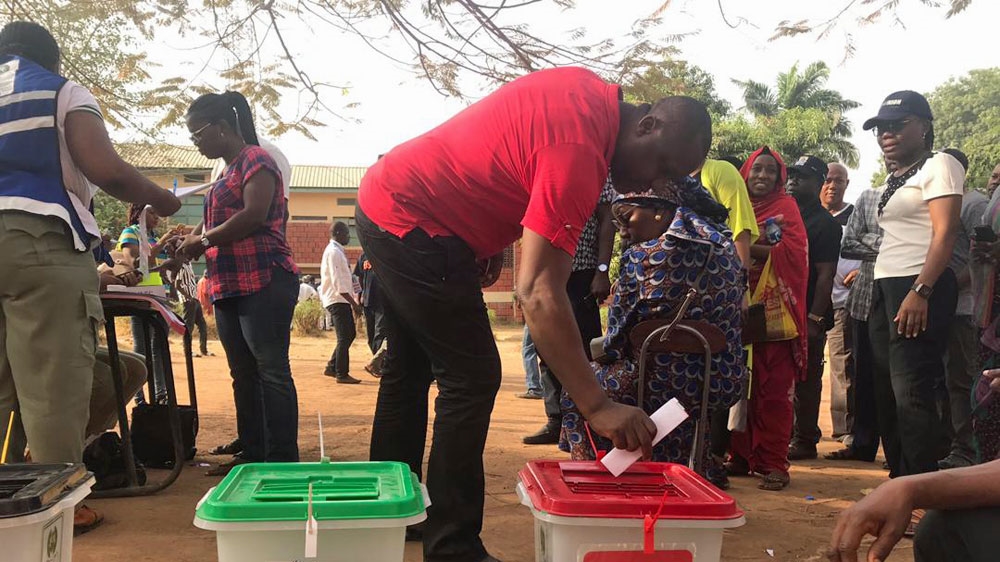Nigerians are finally heading to the polls for the country’s presidential and parliamentary elections after a last-minute postponement last week that angered many voters. They are choosing between two 70-year olds as president
About 120,000 polling stations opened at 07:00 GMT across Africa’s most populous nation with results expected early next week.
A total of 73 presidential candidates are participating in the election, however, incumbent leader, Muhammadu Buhari and former Vice President Atiku Abubakar are the main contenders.
Buhari, 76, who is seeking a second term was nominated by his party, the All Progressives Congress (APC) while Abubakar, 72, beat a host of others to lead the opposition People’s Democratic Party (PDP).
The two parties, which have become well-established in the country, have been providing Nigeria with all its presidents since the end of military rule in 1999.
Buhari and Atiku are both from the mainly Muslim north of the country. They are in their 70s, meanwhile more than half of Nigeria’s 84 million registered voters are under 35, reflecting the country’s young population.
Whoever is elected must tackle the issues of unemployment, corruption, and security challenges, including Boko Haram insurgents.
Buhari, a former military ruler, won the presidential election in 2015, defeating the then incumbent president, Goodluck Jonathan, with over two million votes. This was the first peaceful transition of power in the country. Buhari had campaigned on three issues: security, economy, and anti-corruption.
However, many Nigerians have expressed disappointment in his administration, particularly in the wake of rising poverty and corruption.
There are high levels of inflation while the cost of living and the effects of a recession caused by the slump in global oil prices have led to criticisms about his stewardship of the economy, reports the Vanguard.
Nigeria, Africa’s largest oil producer, has one of the fastest-growing populations in the world, and one of the largest youth populations.
Despite being Africa’s biggest economy, an estimated 91 million Nigerians are now impoverished, the highest number in any country in the world, according to The Brookings Institution.
In spite of the above challenges being experienced by scores of Nigerians, Buhari has said he has done well and would want another four years to complete what he started and other projects.
Buhari’s challenger, Atiku, is popular among many Nigerians as he has been vice president under Olusegun Obasanjo from 1999 to 2007. He has, since 2007, been seeking to be Nigeria’s foremost leader on various occasions but has not been successful.
The 72-year-old’s campaign has been on issues of job creation and the economy. He has particularly pledged to privatise state-run companies, float the embattled naira currency and get “Nigeria working again”, saying that the president has wasted the last four years.
Atiku’s opponents have, however, accused him of corruption dating back to his time as head of the customs service and time as vice president under Obasanjo.
Buhari, whose health issues also became a cause of concern to many Nigerians, has also faced charges of authoritarianism, particularly after suspending the country’s chief justice under graft issues.
Critics called the suspension an “attempted coup against the judiciary”, as the executive has sought to meddle in the judiciary.

Even though voting is going ahead, there are fears of low voter participation as many Nigerians are not willing to make another journey to their cities and hometowns to vote following last week’s delay.
There are also security fears after some heated campaigns in the run-up to the election and other cases of election-related violence left dozens dead and scores injured. Meanwhile, the government has increased security across the country.
How the election will work
To be elected, the candidate must receive the majority and more than 25% of the vote in at least 24 of the country’s 36 states.
The election will go to a second round if no one receives this required number.
Electors are also choosing 360 members of the House of Representatives and 109 senators from a choice of 6,500 candidates.










